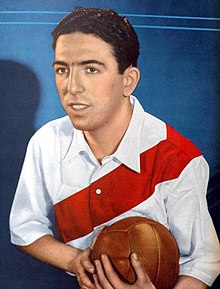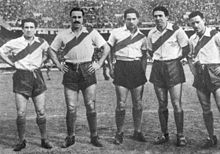Ángel Labruna
 Labruna in 1940 | |||
| Personal information | |||
|---|---|---|---|
| Full name | Ángel Amadeo Labruna | ||
| Date of birth | 28 September 1918 | ||
| Place of birth | Buenos Aires, Argentina | ||
| Date of death | 19 September 1983 (aged 64) | ||
| Place of death | Buenos Aires, Argentina | ||
| Height | 1.71 m (5 ft 7 in) | ||
| Position(s) | Forward | ||
| Senior career* | |||
| Years | Team | Apps | (Gls) |
| 1939–1959 | River Plate | 515 | (294) |
| 1960–1961 | Rampla Juniors | 16 | (3) |
| 1961 | Platense | 2 | (0) |
| 1961 | Rangers de Talca | 5 | (1) |
| Total | 538 | (298) | |
| International career | |||
| 1942–1958[1] | Argentina | 37 | (17) |
| Managerial career | |||
| 1968–1970 | River Plate | ||
| 1971–1972 | Rosario Central | ||
| 1973 | Racing Club | ||
| 1974 | Talleres de Córdoba | ||
| 1975–1981 | River Plate | ||
| *Club domestic league appearances and goals, correct as of 29 Dec 2018 | |||
Ángel Amadeo Labruna (28 September 1918 – 19 September 1983) was an Argentine footballer and coach who played as a forward. With 323 goals scored in official matches, which include 294 league goals, Labruna is the 2nd all-time top scorer of Primera División after Paraguayan Arsenio Erico. Labruna was also part of the celebrated River Plate offense, nicknamed La Máquina (The Machine), and he was considered one of the best South-American footballers of his generation. In his career, Labruna scored 564 goals.[2]
Biography
Labruna was born in Buenos Aires.
Career
Playing career



Labruna's debut in the Primera División was in replacement of José Manuel Moreno who had been suspended by the club, wearing the number 10 shirt. The match disputed on 18 June 1939 in La Plata against Estudiantes, which defeated River by 1–0.
His goals scored and outstanding performances caused that Moreno had to play on the right side of the field when he was allowed to play again. Labruna played in River for 20 years, winning 9 domestic championships with the team (1941, 1942, 1945, 1947, 1952, 1953, 1955, 1956, 1957) and being the top scorer twice (1943 with 23 goals and 1945 with 25).[3]
He was part of his club's legendary team along with Juan Carlos Muñoz, José Manuel Moreno, Adolfo Pedernera, and Félix Loustau, where he played as an inside-left forward. Although this attacking line only disputed 18 games with those players, they were regarded as one of the best forward line in the history of Argentine football. They were nicknamed La Máquina (The Machine) due to their skills with the ball and synchronized play. Coach and former player Carlos Peucelle said that his team was formed by "A goalkeeper and 10 forwards", using an imaginary "1–10".
Labruna holds a number of records for River Plate, including his record of 16 goals in the superclásico derby with fierce rival Boca Juniors.
In 1959, Labruna left River Plate having defended club's colors in 515 matches and scoring 317 goals, 293 in goals what made him the all-time highest goalscorer in the Argentine first division along with Arsenio Erico, a record that remains nowadays. He later played two seasons in the Chilean C.S.D. Rangers, and Uruguayan team Rampla Juniors of Montevideo, before returning to Argentina to finish his career at Platense, when he was 43 years old.
Labruna played 37 matches for the Argentina national team, scoring 17 goals. He also won two South American Championships (1946 and 1955) and as a nearly 40-year-old he played in the final phase of 1958 FIFA World Cup held in Sweden.[4]
As other great players of his generation, Labruna could not participate in other World Cups due to the event's suspension during World War II and later for the decision taken by the Argentine Football Association, which did not compete in the World Cups of Brazil and Switzerland.
| Team | Years | Matches | Goals | Average |
|---|---|---|---|---|
| River Plate[5] | 1939–1959 | 533 | 317 | 0.62 |
| Rampla Juniors | 1960 | 16 | 3 | 0.19 |
| C.S.D. Rangers | 1960 | 3 | 1 | 0.00 |
| Platense | 1961 | 2 | 0 | 0.00 |
| Argentina national team[6] | 1942–1958 | 37 | 17 | 0.46 |
| Total Career | 1939–1961 | 573 | 341 | 0.59 |
Coaching career

After ending his career as a player he became Assistant Coach and Coach in River Plate, Defensores de Belgrano, Platense, Rosario Central (where he won his first Nacional championship, in 1971), Talleres de Córdoba, Racing Club, Lanús, Chacarita and Argentinos Juniors.
In 1975 River called Labruna to offer him work as coach. Labruna won two championships that same year, breaking a "curse" of 18 years without titles. Labruna's period in charge of River Plate brought the club much domestic success, a side endowed with players such as Daniel Passarella, Norberto Alonso and Leopoldo Luque.
Personal life
Labruna had two sons, Daniel (died in 1969) and Omar, who worked with Ramón Díaz in River Plate and then coached Olimpo de Bahía Blanca and other teams.
Labruna died on September 19, 1983, from a heart attack, at 64 years old. He is buried at La Chacarita Cemetery in Buenos Aires. Every September 28, River Plate's fans celebrate the "International River Plate Fan's Day" as a tribute to one of the club's greatest idols.
Honours
Player
River Plate
- Argentine Primera División: 1941, 1942, 1945, 1947, 1952, 1953, 1955, 1956, 1957
- Copa Ibarguren: 1937, 1941, 1942, 1952
- Copa Adrián C. Escobar: 1941
- Copa Aldao: 1941, 1945, 1947
- South American Championship of Champions runner-up: 1948
Argentina
Manager
- Rosario Central
- River Plate
- Primera División: Metropolitano 1975, Nacional 1975, Metropolitano 1977, Nacional 1979, Metropolitano 1979, Metropolitano 1980
- Copa Libertadores runner-up: 1976
Individual
- Copa Aldao top scorer: 1941, 1945, 1947 (joint)
- Argentine Primera División top scorer: 1943 (joint), 1945
- IFFHS Argentina All Times Dream Team (Team C): 2021[7]
References
- ^ "Angel Amadeo Labruna – Goals in International Matches". Rec.Sport.Soccer Statistics Foundation.
- ^ "Labruna".
- ^ "Argentina - List of Topscorers". RSSSF.
- ^ "World Cup 1958 finals". RSSSF.
- ^ "IFFHS (International Federation of Football History & Statistics)". IFFHS.
- ^ "Argentina - Record International Players". RSSSF.
- ^ "IFFHS ALL TIME ARGENTINA MEN'S DREAM TEAM". 26 August 2021.
External links
![]() Media related to Angel Labruna at Wikimedia Commons
Media related to Angel Labruna at Wikimedia Commons
- El Feo Labruna – Tribute webpage (in Spanish)
